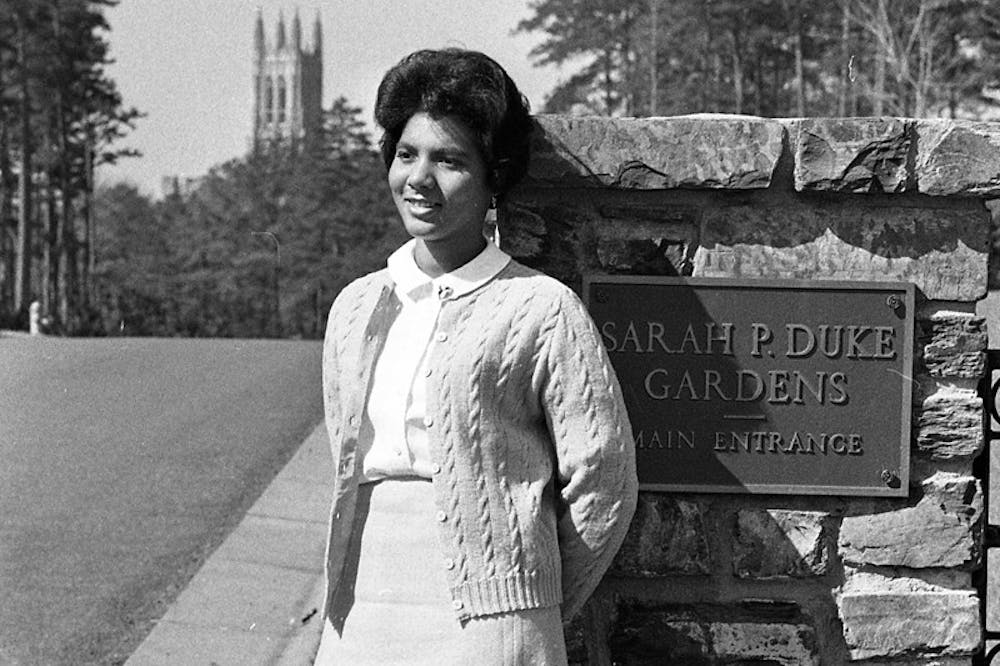Wilhelmina Reuben-Cooke’s primary pre-requisite for a college was that it was far away from South Carolina.
For that reason, Duke didn’t top her short list of potential colleges when it came time for her decide where to matriculate in the early 1960s. But she had other reservations about Duke as well—her father was a doctorate student in the Divinity School at the time, and even his promise to keep his distance if the two ended up on campus together wasn’t persuasive.
After her father’s advisor suggested that Reuben-Cooke consider attending Duke, however, the then-high school senior was finally convinced to see campus for herself—a campus which she later realized was captivating.
“[My going] to Duke was not pre-planned,” Reuben-Cooke, Woman’s College ’67, says now. “I visited the school primarily so that my father could please his advisor.”
Fifty years after her initial matriculation, Reuben-Cooke now stands amidst a diverse group of alumni and students conversing in the lobby of the Fitzpatrick Center on this February afternoon. Gathered for the Duke Career Conference, individuals of all colors mingled because of their connection to their alma mater. Indeed, Reuben-Cooke played a unique role in the development of what the University stands for today: now a professor of law at the University of the District of Columbia, she was one of the first black undergraduates to enroll at Duke. And making history was the name of the game for her family; her father was a member of the first class of black doctorate students at the Divinity School, making him one of the first four black students to matriculate at a Duke graduate school.
“I felt like I had a sense of obligation [to attend], and like I was being afforded a great opportunity,” Reuben-Cooke says of her decision to join a predominantly white institution.
Reuben-Cooke was joined by four other students in the Fall of 1963, at the height of the Civil Rights Movement. Mary Mitchell Harris and Cassandra Smith Rush joined Reuben-Cooke in the Woman’s College while Gene Kendall and Nathaniel “Nat” White Jr. entered the all-male Trinity College. Today, Kendall, White and Reuben-Cooke are the three surviving members of the original cohort.
Duke had chosen to integrate long after many other schools in the South, which had either chosen or were forced to open their doors to all worthy applicants, regardless of race. The University of North Carolina system had integrated in 1955. That Duke—as a private institution—had the power to internally choose whether or not to desegregate allowed the University to take the proper steps to ensure a smooth transition.
Yet Duke was not the most inviting campus. At the time of the students’ enrollment, the University had no black faculty, administrators or trustees, and the students came to find segregated bathrooms and designated “colored” signs throughout campus.
“We did not expect violence, but we were confronted,” Reuben-Cooke says.
Despite coming from a segregated school system, Reuben-Cooke asserts that she did not feel out of place in an academic setting with white students. She noted that her high school had an integrated faculty and that she had taken a class in New York in which she was the only black student. At Duke, she recognized that she and the other black undergraduates would likely be the first blacks—or “negroes,” as she notes was the term used at the time—that many of her fellow students would interact with on a peer level.
“I grew a lot at Duke. I was engaged in many activities, met people and was involved in campus life,” Reuben-Cooke reflects. “I did not just sit around in my room.”
Her many activities included the Young Women’s Christian Association and the then-named Freshman Advisory Council, which she would later lead. She believes that the structure of the Woman’s College was probably more supportive of its students since the dormitory system meant that female students usually lived in the same dorm all four years, thereby fostering a strong community. Reuben-Cooke went on to be elected May Queen, which required that she receive the most write-in votes of any female student in her class.
Back on campus at events like the recent Career Conference, Reuben-Cooke has been active in observing her alma mater commemorate a half-century of integration—in many ways marking her arrival at Duke. She says that her opinion of the celebration depends on the motives of the University.
“If it is simply to say we opened our doors, then that’s not much,” she remarks. Duke should use this opportunity to examine what it means to be inclusive and to look at how the University has grown from diversity, she says.
“Because of [Duke’s] Southern roots, it cannot escape discrimination,” she notes. “But the expectation is that Duke confronts these problems.”
Reuben-Cooke, who went on to serve two terms as a member of the Board of Trustees, says that continued controversies concerning race do not faze her, but are indications that the University has room for progress.
“It’s a sign that there is still work to be done in making Duke a community for all,” she comments.
Her advice to all students, including students of color, is simple yet profound: “Claim the University as your own: You belong here and make the most of it. Build networks. See Duke as an opportunity to build yourselves and to serve others.”
Get The Chronicle straight to your inbox
Signup for our weekly newsletter. Cancel at any time.

